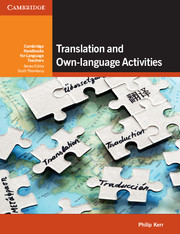Book contents
Summary
It is probably the case that most teachers who use their students’ own language as an important part of English language learning do so in activities that focus on discrete items of language, such as vocabulary or grammar (see Chapter 7). The students’ own language can, however, be used economically and effectively to facilitate the development of the ‘four skills’ (reading, writing, listening, speaking). In addition, it lends itself to integrated skills work, as can be seen from a number of the activities in this chapter.
Translation, itself, could be also regarded as a language skill. Some writers, such as Maurice Claypole describe it as the fifth skill, ‘the vital skill of negotiating between two languages’ (Claypole, 2010). This is not the same as professional translating or interpreting, or even the kind of translation required for many philology courses at university: it is simply part and parcel of the day-to-day business of communicating with speakers of other languages. This, too, is reflected in a number of the activities in this chapter. These activities are intended primarily for language learners, rather than students following a translation course, although the latter will also benefit.
In conjunction with the activities described in this chapter, I would recommend teachers to look again at the basic techniques outlined in Chapter 2. Techniques 2.1: Sandwiching; 2.2: Giving instructions; 2.3: Own-language moments, and 2.4: Language monitoring, can all help learners with the development of their listening skills. Techniques 2.3 and 2.4 can help with speaking, not least in building confidence. I would also recommend revisiting the tools described in Chapter 4, most of which are especially helpful when it comes to reading and writing.
Glossaries
The provision of language support for learners in the development of their speaking and writing skills has long been standard practice. This may take the form of exercises, prior to the speaking or writing task, which focus on the language that the learners will need for the particular task: functional language, discourse markers, set phrases, etc. More simply, the tasks may be accompanied by ‘Useful language’ boxes. At lower levels especially, judicious use of the learners’ own language may facilitate this kind of work.
- Type
- Chapter
- Information
- Translation and Own-language Activities , pp. 93 - 120Publisher: Cambridge University PressPrint publication year: 2014



